It’s always unsettling to wake up from a long slumber and notice strange marks on your body.
Or maybe you wake up to a strong itching or burning sensation on your back…
But can’t quite see what the problem is.
It’s natural to think that you have been bitten by insects in the middle of the night.
But how do you know which insect?
Without much thinking, people naturally gravitate toward the thought of bed bugs, and whether they need to be concerned.
But before you jump to conclusions….
You should properly identify, diagnose, and prove that the bites you experienced were from bed bugs.
Because if you seek medical treatment.
Or try to remove an infestation…..
You better make sure you’re not mistaking bed bugs for other, similar-looking insects.
Bites require specific treatment and infestations require a specific process for removal. It’s critical that you understand what you’re up against before you take serious action.
So on that note…..
Let’s dive in.
Page Contents:
How to Identify Bed Bug Bites
Signs and symptoms of bed bugs can be difficult to detect. Though these insects can be seen with the naked eye, they hide in dark, hard to reach places during the day.
Visible bites on your skin will take on the following characteristics:
- Slightly discolored, red dots (about the size of ¼ to ¾ inches in diameter.
- You see multiple bites in a row or in a zigzag pattern.
- You could see hives or a red circle on the skin that surrounds the bites.
If you’re having an adverse health issue like an allergic reaction from bed bug bites. Your bites may blow up to the size of 2 inches or more and turn into painful blisters.
Another problem is. After you have been bitten:
The bites DON’T always show up right away.
In fact, bites may not show up for days after you have been bitten.
(or even weeks in some cases)
If you suspect bed bugs but don’t have any bites to show for it….
You can look for the tell-tale signs that an infestation exists in your home.
Signs of Bed Bugs
Look for Colored Spots
You should check the mattress, box spring, and within your sheets for blood spots or bed bug droppings.
These spots will be a brown, reddish color and you should see multiple in one place.
Use Your Nose
Bed bugs have glands in their body that produce an unpleasant odor that’s sort of an unhealthy combination of musty and sweet.

When in large numbers….
The smell can be VERY strong.
If your bedroom consistently smells like a wet towel or a locker room, you may be able to identify an infestation without the physical signs.
Look for Eggs or Nymphs
Adult bed bugs can be hard to spot, but sometimes you can find bed bugs earlier in their lifecycle.
Female bed bugs can lay up to 12 eggs per day (500 in their lifetimes) so there are bound to be bed bug eggs that you can spot.
Eggs are small, without much color (maybe off-white).
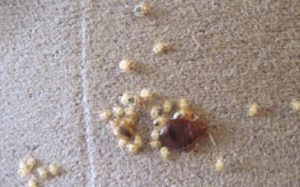
You should also be on the lookout for nymphs.
(baby bed bugs)
Which are typically less nimble and slower than their adult counterparts.
Bed Bug Bite Pictures
Here are a few pictures of what bed bug bites look like.
Looking at cases of differing degrees of severity:
Mild Bites: In this case the victim has experienced a few bites in a cluster.

Mid-Tier Bites: Here we are seeing a high volume of bites, indicating a severe infestation was present.
It’s important to note that these bites are small/medium sized, and haven’t led to any severe skin reactions.
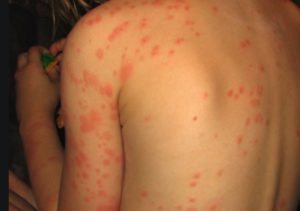
Severe Bites: Here you can see that the bites have grown to be 2 to 3 inches wide in diameter.
This is indicating a harmful skin reaction is present.
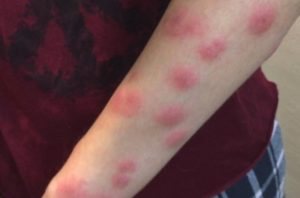
Bed Bug Bites vs. Mosquito Bites
Bed bugs and mosquitos have vastly different physical qualities, but their bites are often confused with each other.
Symptoms:
Mosquito bites are puffy white red bumps that occur a few minutes after bitten. With bed bugs, symptoms are more variable, and bumps may not show up for weeks.
Time to Heal:
Mosquito bites will heal up much quicker, typically within 2 to 3 days.
While bed bugs bites persist for much longer.
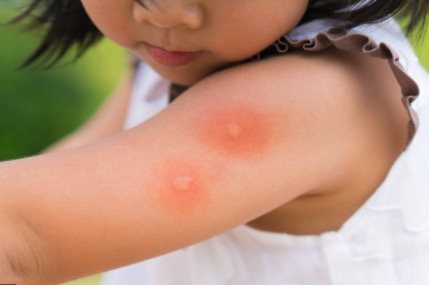
Where They Bite:
Mosquito bites are usually distributed throughout the body in areas of exposed skin. This includes the legs, face, back, neck, arms etc.
Bed bug bites are more clustered and occur in a distinct pattern.
Bed Bug Bites vs. Flea bites
Symptoms:
You’ll typically feel a Flea bite instantly after being bitten.
Both bed bug and Flea bites can cause inflammation, which can lead to noticeably larger welts than what would occur from other insect bites.
Where They Bite:
You can expect to find Flea bites on your lower body, that appear in random groupings.
Bed bug bites are more commonly in a straight line (or zig zag pattern),
Whereas Flea bites will occur in random looking clusters.
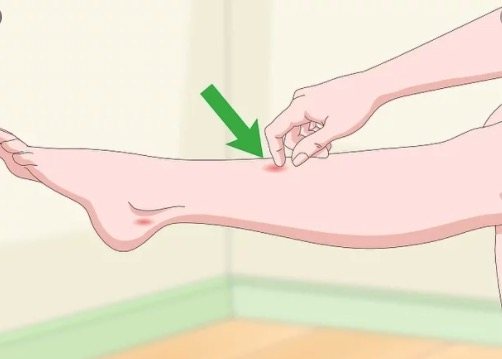
Dangers:
If you’re allergic to fleas, you could develop hives or a rash, similar to being allergic to bed bugs. The difference is that fleas are much more likely to cause a skin infection.
A common infection is called Tungiasis.
(Yes, it’s hard to pronounce)
This infection almost always occurs between the feet and toes.
Certain Fleas will dig under your skin to feed, which leads to this very complicated infection.
Bed Bug Bites vs. Hives
Bites from bed bugs are often mistaken for hives, mainly because they both stem from an allergic reaction.
It’s critical that you’re able to tell these 2 skin conditions apart because…
They each require different types of treatment.
Size:
Bed bug bites will be fairly consistent in size and hives can be across the board. Some hives can look as big as a quarter or as small as a pimple.
Color and Shape:
While bed bug bites are consistently red, the color of hives will vary, from either pale to dark red.
Bed bug bites are usually perfectly round, while Hives can have more diverse, uneven looking shapes.
Location:
Bed bug bites can only occur in places that your skin is uncovered.
Such as:
Your neck, arms, legs, or face.
Hives can occur anywhere on your body, it makes no difference whether your skin is covered or not.
How To Diagnose Bed Bug Bites
To fully diagnose a bed bug bite, you must look beyond the symptoms.
These bites can be easily confused with other insects or skin reactions, so it’s important to look at…
These 3 different factors when diagnosing your bites:
History
To determine whether bites are from bed bugs, it helps to look into the history of bed bugs in the site that you were bitten.
If you were bitten in an apartment complex, You should see whether your neighbors have had any previous or active infestations.

Though, people stay pretty quiet about their infestations…
So you can also look into public record for any landlord-tenant disputes that may have occurred at your rental property.
You should also ask yourself:
If you moved into a new home, has the home has a history of infestations?
Home Inspection
Has your bedroom been properly inspected for an active infestation?
It’s important that a professional inspect your home thoroughly for signs of bed bugs.
This includes areas such as
- The bedroom (including mattress/box spring, bedding, bed frame)
- Walls and baseboards
- Behind furniture
- Any other cracks or crevices within your home

The Appearance of Bites
Though bed bug bites can easily be confused with other insects, a doctor should be able to diagnose your bites when looking closely.
Bed bug bites have a unique shape, and pattern, that a skilled physician should be able to identify.
Mild Bed Bug Bites
It’s impossible to predict whether a person will have a mild or severe reaction to bed bug bites.
Why?
Because everybody’s skin reacts differently, so the range of outcomes is extremely wide.
More often than not, symptoms of bites are fairly mild. Meaning you’ll experience some irritation for a few days along with unsightly red bumps or welts on your body. Bites like these are a light inconvenience but will not upend your life or debilitate you as a severe reaction would.
Keep in mind that…
Even if a bed bug bite starts off as mild, it can turn more serious fairly quickly.
Here are a few ways that can happen.
One is if you scratch the bites – it can lead to more severe symptoms like:
- Intense burning or itching.
- Bleeding or open wounds.
- Scarring (in rare cases you may get keloid scars).
Bites can also turn more serious if you have other skin reactions while you currently have active bites on your body. Whether it’s a generic rash, or a breakout of hives, these types of reactions can exacerbate existing bites.
Here are some pictures of mild bed bug bites:
Below is a picture of a toddler who was bitten a few times on his ankles and feet.
(Click here for more information about how bed bug bites affect children).
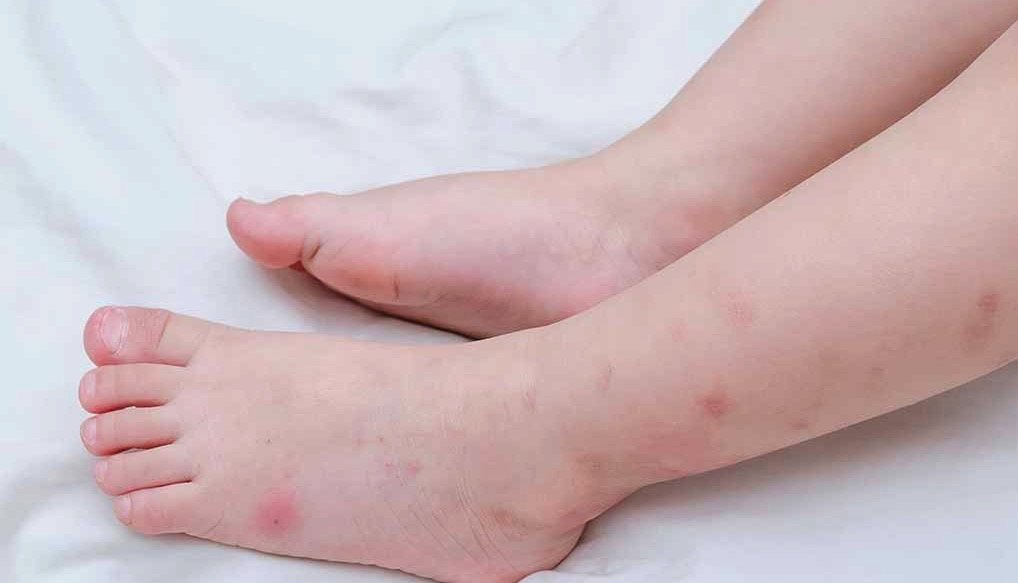
Below is a picture of a slightly more severe reaction.
(Although still considered mild).
Here you can see a woman who has around 10 bites on her back.
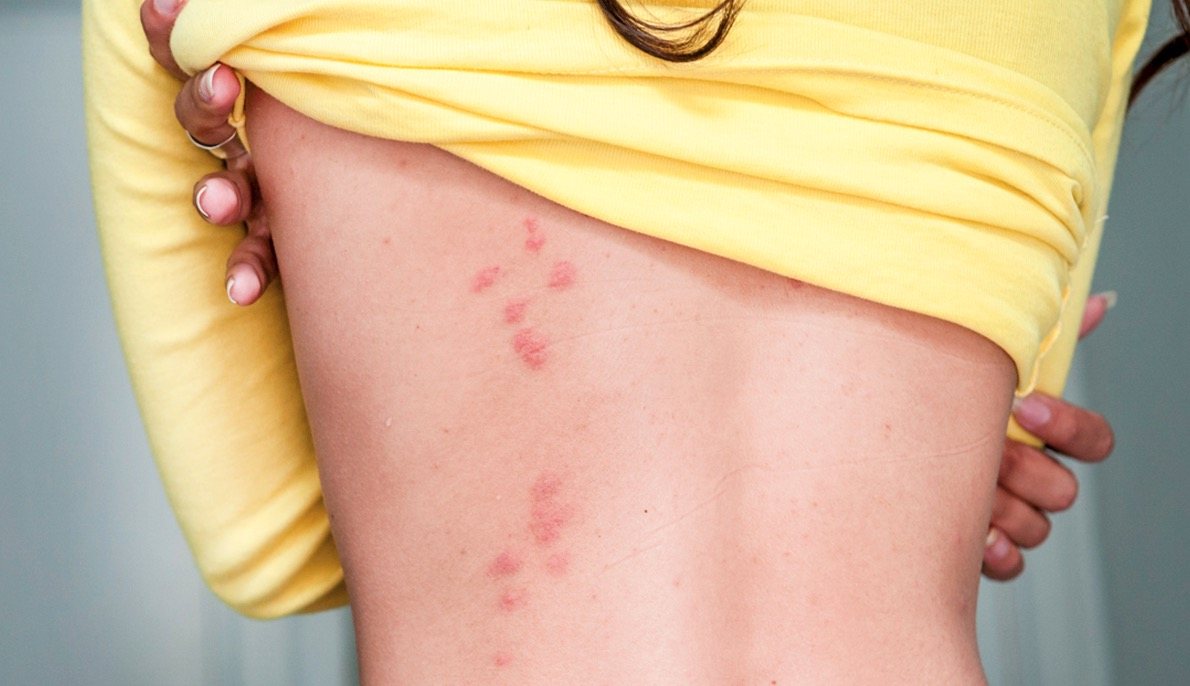
How Long Do Bed Bug Bites Itch?
Bed bug bites can itch anywhere from 3 to 10 days. The extent and longevity of the skin reaction is highly dependent on the individual and how they treat their bites. If an individual treats their bites with medication and care, then bites will disappear much more quickly.
Here are a few treatment methods to help relieve symptoms and help bed bug bites heal faster.
Calamine Lotion: This is a medicated anti-itch lotion that can be applied multiple times per day to relieve symptoms.
Antihistamines: You can take antihistamines orally to help reduce itching or any burning that’s occurring. This is an effective method when you’re experiencing disturbed sleep due to physical symptoms or anxiety from bed bugs.
Advil or Tylenol: Over the counter pain reliever medication can help reduce pain and any swelling that may occur from the bites.
Stick with reputable medications to help alleviate bed bug bites so that they go away quicker.
If after a few weeks your bites still haven’t gone away…
You should contact a doctor or health professional to evaluate your skin.
How Long Do Bed Bug Bites Last?
The length of time a bed bug persists on skin will depend on the individual.
Since a bite can take up to TWO weeks to show on up on skin, the consensus is they take around:
10 to 14 days to disappear.
Although, those with more sensitive skin….
Will see bites in less than an hour after being bitten, and it could take up to 30 days for the bites to full disappear.
In more severe cases, victims develop anaphylaxis and require immediate medical attention.
Others (the lucky ones), may not notice or even experience bites at all.
Bites will last longer if any of the following occurs:
- Aggressive scratching: This can cause scarring and also cause the wounds to fester and burst.
- When left untreated: Bites do eventually go away on their own, but certain treatments will help accelerate the healing process. In fact, Pinterest has a board with 27 natural home remedies for bed bugs.
- Infection: If the bites turn into open wounds which then become infected, this will cause your bites to last a lot longer.
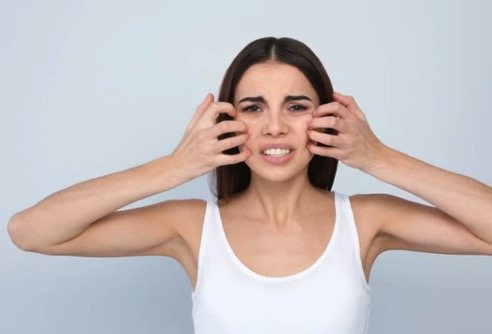
Bed bug bites typically last much longer than other insect bites like mosquitos.
You’ll need to be patient as your bites heal, and try to fight the urge to scratch and further irritate your wounds.
The fact that these bites persevere so long, is one of the main reasons that bed bugs can lead to long term psychological issues within victims.
How to Treat Bed Bug Bites Naturally
Bed bugs will target the areas of your skin that are exposed while you’re asleep.
Once you have been bitten, you should wash the area with soap and water.

Once the areas around the bites are clean.
You can try the following natural treatment options:
Salt
This is a natural bacterial agent and can help reduce the size of rashes and inflammation caused by your bites. Applying some light salt on the affected area may provide some relief to the irritated skin.
Try this method 3 times per day (and continue as needed)
Toothpaste
Most toothpaste products contain Menthol, which will naturally cool the skin around the bite. This especially works if you feel a burning sensation coming from the affected skin.
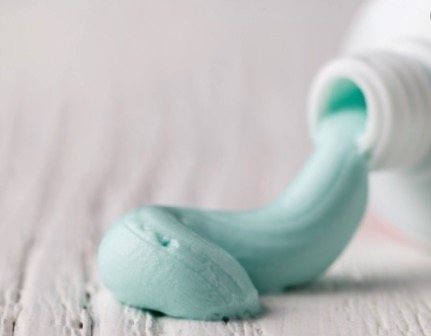
Apply a dab of toothpaste on the affected area and rinse away after 10 minutes. Repeat this process a few times a day.
Ice Packs
Ice is known for its ability to numb your skin.
(specifically, your nerve endings)
And provide relief to a burning or itching sensation.
Ice is also great for reducing swelling or inflammation that can result in more serious reactions to bed bug bites.
Take your ice pack and apply it to the affected area for 10 to 15 minutes max.
Continue to repeat the process as needed.
Apple Cider Vinegar
This product has applications for many different home treatments.

It has the capacity to be:
- An antiseptic
- Antibacterial
- Anti-inflammatory
- Antifungal
To heal bed bug bites with apple cider vinegar, simply soak a cotton ball with this vinegar and apply it to the bites.
Feel free to reapply up to 5 times per day as the symptoms persist.
Can Bed Bug Bites Kill You?
A lot of talk goes around when it comes to bed bugs.
People spread rumors resulting in myths about bed bug symptoms and certain DIY methods of treatment that may or may not work..
The short answer to this question is:
NO. Bed bugs will not kill you.
More often than not bed bugs only cause light skin irritation.
Now there are situations where people can have adverse reactions to bed bugs, that in VERY rare circumstances may lead to death.
Although this would have to be due to a serious preexisting condition.
At the end of the day, bed bugs typically won’t cause physical harm, if anything they do more emotional damage than physical.
Check out the video below for 7 important things to know about bed bugs.
Summary
There are many traits that can indicate whether a bite is from bed bugs.
The infographic below contains a complete breakdown of the different characteristics of a bed bug bite.
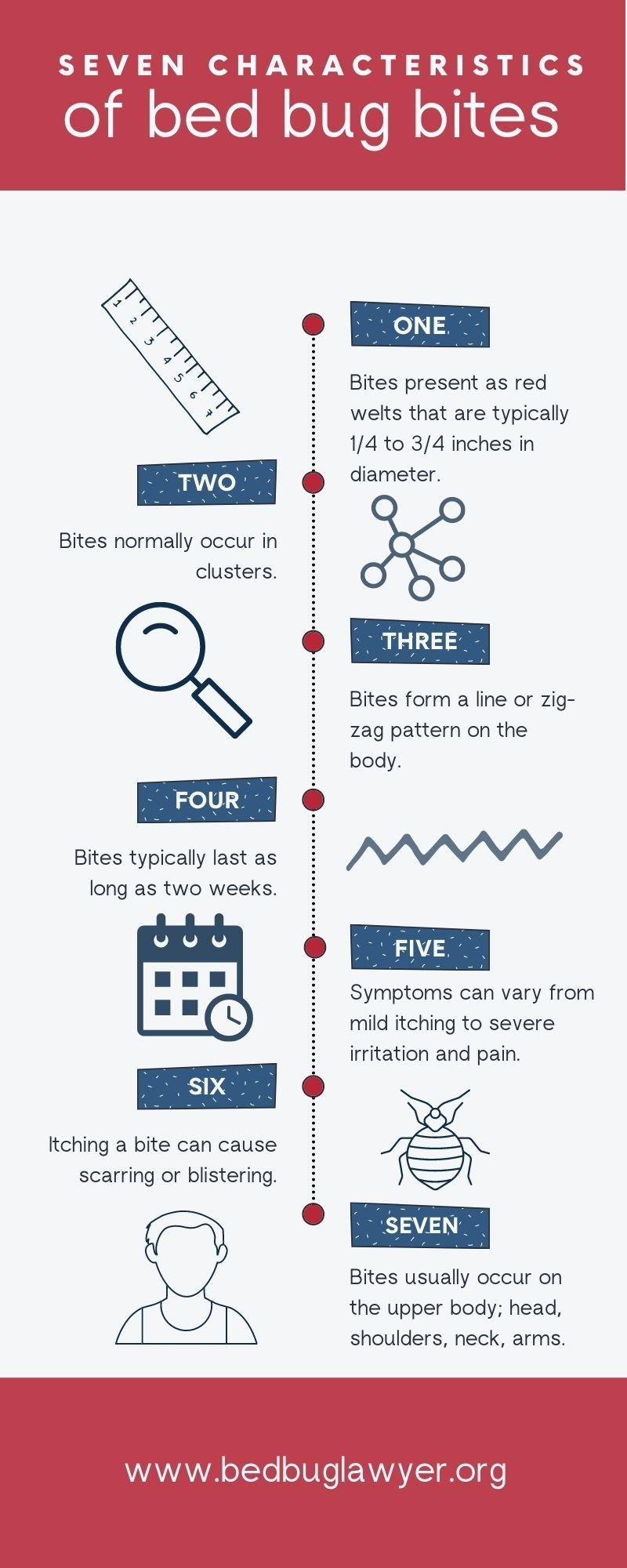
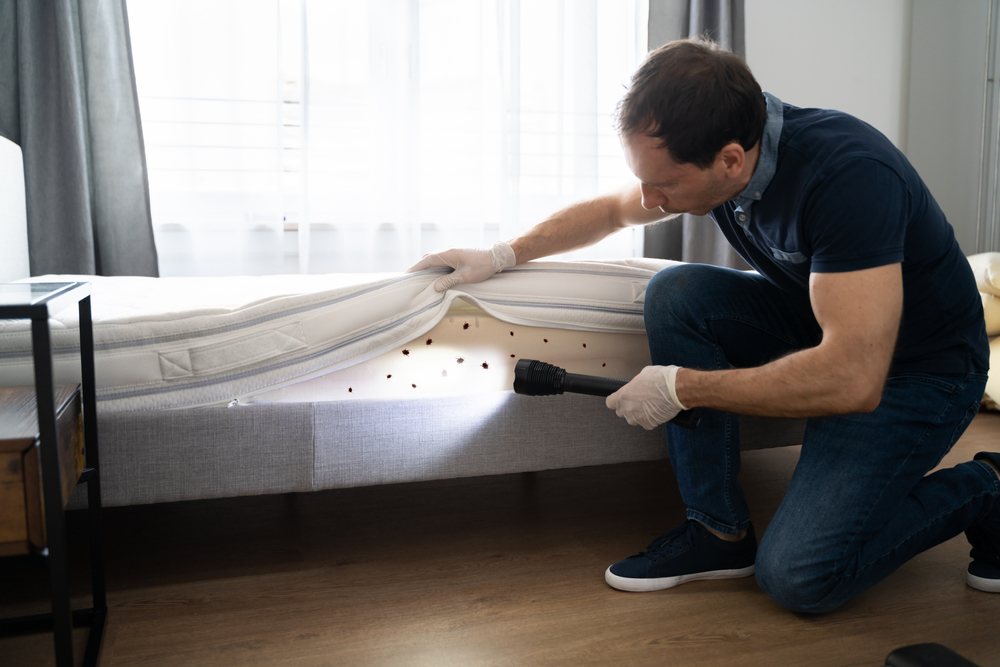
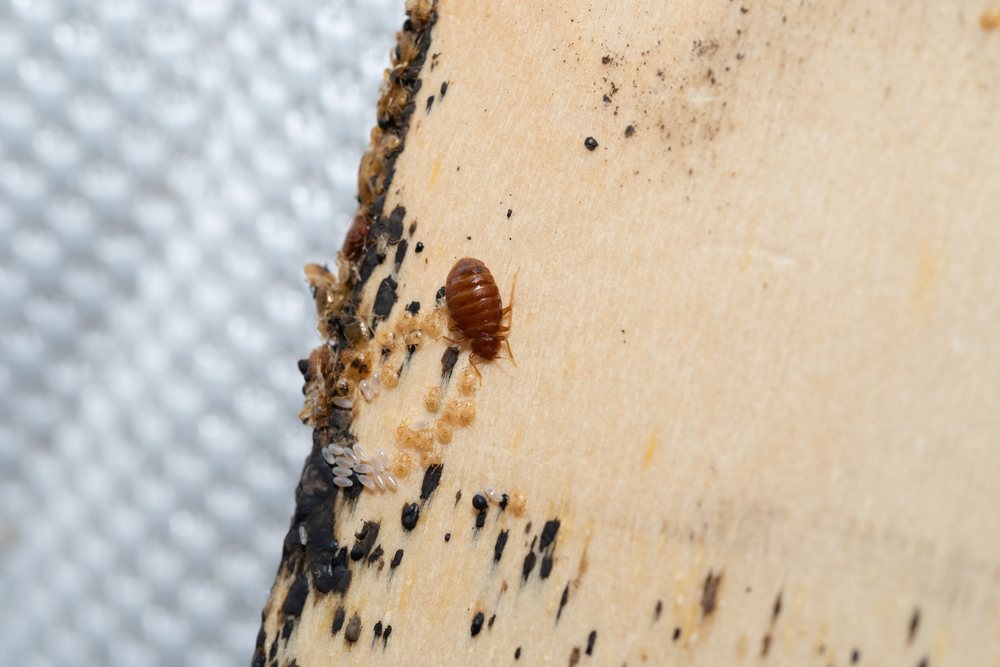



I have so many bites though I have a hard time understanding exactly what insect it is… I keep thinking it’s bed bugs but the exterminator is assuring me that it’s not. Can I send pictures?
Please help me.